Scholars
2022
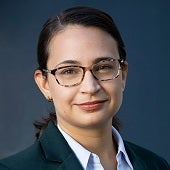
Sara Hussain, PhD
Assistant Professor
Department of Kinesiology and Health Education
University of Texas at Austin
Email: sara.hussain@austin.utexas.edu
Dr. Sara Hussain is a human neurophysiologist and Assistant Professor in the Department of Kinesiology and Health Education at the University of Texas at Austin. She obtained her BS and PhD in Human Physiology from the University of Iowa before completing postdoctoral training at the Human Cortical Physiology and Neurorehabilitation Section at the National Institute of Neurological Disorders and Stroke.
Dr. Hussain’s research focuses understanding the oscillatory mechanisms of human motor control, developing new interventions that target these mechanisms, and translating these interventions to the post-stroke brain. To achieve this, she combines non-invasive neurophysiological techniques with behavioral assessments and machine learning. She is currently developing personalized closed-loop brain stimulation to improve hand function in chronic stroke survivors. Outside of the lab, she enjoys cooking, reading, birdwatching, and gardening.
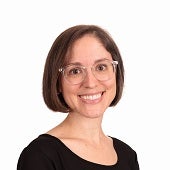
Mackenzie Fama, PhD
Assistant Professor
Department of Speech, Language, and Hearing Sciences
The George Washington University
Email: fama@gwu.edu
Dr. Mackenzie Fama is a neuroscientist and speech-language pathologist. She earned her bachelor’s degree in linguistics and philosophy from the College of William & Mary and went on to a master’s program in speech-language pathology at the University of North Carolina at Chapel Hill. While there, she developed a passion for aphasia, a language disorder often acquired through stroke. After spending four years as a clinical speech-language pathologist on the stroke unit at MedStar National Rehabilitation Hospital, she earned her PhD in neuroscience under the mentorship of Drs. Peter Turkeltaub and Rhonda Friedman at Georgetown University.
Dr. Fama is now an Assistant Professor and the director of the Fama Aphasia Recovery (FAR) Lab at The George Washington University in Washington, DC. The overall focus of her research program is to understand stroke survivors’ own experiences of their language difficulties, in conjunction with objective behavioral and neuroscientific research methodologies, in order to improve recovery outcomes in aphasia. Her current work focuses on the experience of inner speech, or the ability to use language in one’s head, among individuals with aphasia. Her project focuses on the neural bases of inner speech and the role of inner speech in predicting treatment outcomes for stroke survivors with aphasia.

Davetrina “Seles” Gadson, PhD
Instructor
Department of Rehabilitation Medicine
Georgetown University Medical Center
Email: dg988@georgetown.edu
Dr. Davetrina “Seles” Gadson is a neuroscientist and ASHA-certified speech-language pathologist with expertise in adult neurological rehabilitation and health outcomes. She earned her Bachelor of Arts degree from South Carolina State University and Master of Science degree from Towson University in Speech-Language Pathology and Audiology. Dr. Gadson was the first African-American to graduate with a Ph.D. in Communication Sciences and Disorders from the University of Georgia. Her published dissertation research centered on health-related quality of life in Black American stroke survivors with and without aphasia.
Dr. Gadson completed her post-doctoral training at Georgetown University School of Medicine in Neurology with Dr. Peter Turkeltaub. During this fellowship, she studied conceptual and technical neuroimaging research methods to understand the contribution of spared brain structures to recovery in stroke survivors. As a clinical researcher, she is interested in the influence of health disparities on minority stroke survivors and the effect of such disparities on brain functioning, behavioral performance, and health-related quality of life. Dr. Gadson’s research will focus on health equity in stroke recovery, specifically the relationship of race and socioeconomic status to language, cognition, and quality of life in people with aphasia.
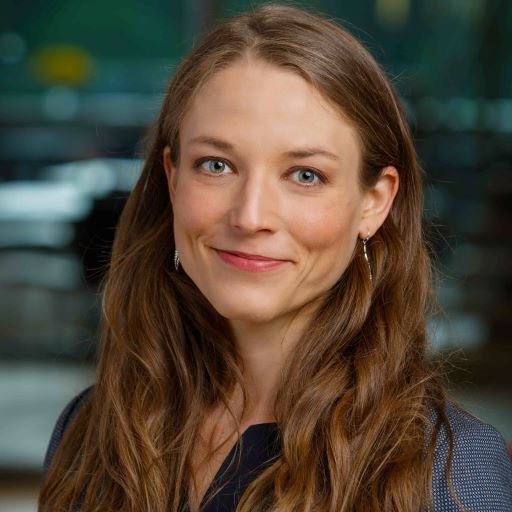
Sara Pillay, PhD
Associate Professor
Department of Neurology
Medical College of Wisconsin
Email: sapillay@mcw.edu
Dr. Sara Pillay is a clinical neuropsychologist and Associate Professor in the department of Neurology at the Medical College of Wisconsin. She earned her Bachelor’s degree in psychology from the University of Wisconsin-Milwaukee before earning a Ph.D. in clinical psychology from Rosalind Franklin University of Medicine and Science. She then completed a clinical psychology internship at the Clement J. Zablocki Veterans Affairs Medical Center followed by a two-year fellowship specializing in neuropsychology at the Medical College of Wisconsin.
Dr. Pillay’s research background has primarily focused on examining the neural organization of phonological-based language processes in patients with aphasia, work that was supported by a pre-doctoral fellowship from the American Heart Association. Currently, she is investigating the neural and behavioral changes that occur in patients with chronic aphasia after they receive a process-focused speech therapy intervention coupled with transcranial direct current stimulation. This work focuses on trying to understand how patients with phonological impairments recover and hopes to inform future development of translational clinical rehabilitation tools that further support recovery.
2020
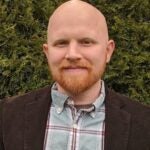
David Cunningham, PhD
Assistant Professor
Department of Physical Medicine and Rehabilitation
MetroHealth Rehabilitation Institute and Case Western Reserve University
Email: dxc536@case.edu
David Cunningham is an Assistant Professor in the Department of Physical Medicine and Rehabilitation at MetroHealth Rehabilitation Institute (MRI) and the Case Western Reserve University (CWRU) School of Medicine. He earned BS and MS degrees in Exercise Physiology from Ohio University and Texas A&M University and a PhD in Neuroscience from Kent State University, where he performed his dissertation work at the Cleveland Clinic in the department of Biomedical Engineering under the guidance of Dr. Ela Plow. Dr. Cunningham completed his post-doctoral fellowship training at Kessler Foundation, in West Orange, NJ, under the guidance of Dr. Guang Yue, and at MRI and CWRU School of Medicine in Cleveland, OH, under the guidance of Dr. Jayme Knutson.
Dr. Cunningham’s research has focused on studying neurophysiologic adaptations in participants with neurological impairments as a result of injury as well as recovery using methods of non-invasive brain stimulation (transcranial magnetic stimulation and transcranial direct current stimulation) and neuroimaging (fMRI, resting state fMRI and DTI). His research has focused on determining whether pairing non-invasive brain stimulation with traditional therapies are generalizable to all patients or do the mechanisms of non-invasive brain stimulation and traditional therapies fail based on severity of impairment. In addition, Dr. Cunningham’s laboratory seeks to understand the brain-state-dependent effects of neuromodulatory interventions on neuroplasticity as well as optimize the interaction between two neuromodulatory rehabilitative interventions in order to better treat neurologically based impairments.
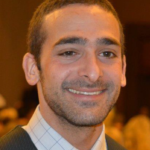
Andrew DeMarco, PhD, CCC-SLP
Assistant Professor
Department of Rehabilitation Medicine
Georgetown University
Email: Andrew.DeMarco@georgetown.edu
Dr. DeMarco is a neuroscientist and ASHA-certified speech-language pathologist, currently completing his training as a postdoctoral fellow in Dr. Peter Turkeltaub’s Cognitive Recovery Lab at Georgetown University. Dr. DeMarco received a bachelor’s degree in linguistics and completed his clinical training at Temple University. He then obtained a PhD in Speech, Language, & Hearing Sciences at the University of Arizona under Pélagie Beeson, where his doctoral work focused on understanding the neural substrates of treatment-induced recovery in aphasia using task-based fMRI. As a postdoctoral fellow at Georgetown, he has received training in the use of neuromodulation to enhance aphasia therapy outcomes and exposure to machine learning methods. He has published a toolbox for multivariate lesion-symptom mapping and his most recent work has involved developing a machine learning technique, functional anomaly mapping, to derive brain-wide maps of dysfunction to measure direct and indirect effects of stroke lesions. Currently he is optimizing this technique and plans to deploy it to study aphasia recovery and aphasia neurorehabilitation. His research goals include understanding the neural architecture of language and its breakdown in aphasia. In addition, he also aims to develop clinical translational functional neuroimaging for aphasia rehabilitation, with the ultimate goal of optimizing clinical outcomes in aphasia neurorehabilitation.

Shashwati Geed, PhD
Assistant Professor
Department of Physical Therapy and Movement Sciences
The University of Texas at El Paso
Email: sgeed@utep.edu
Shashwati Geed is an Assistant Professor of Physical Therapy and Movement Sciences at the University of Texas at El Paso.
Shashwati’s research focuses on the mechanisms of upper extremity (UE) motor function recovery after stroke. Her translational research integrates two fields in stroke recovery, the neurobiology of critical period neuroplasticity and the neurophysiology of post-stroke recovery. A long-term goal of this work is to use the mechanisms of time-limited, brief windows of heightened neuroplasticity, called critical periods, to enhance motor function recovery in adults after stroke. A second research interest is to improve stroke rehab trial methods by optimizing how we measure and statistically model change (in behavior, impairment etc.) in neurorehab trials.
Shashwati has a background in physical therapy and a PhD in motor control from the University of Wisconsin-Madison. She also acquired an extensive background in statistical modeling during her PhD at UW Madison. As a postdoc at MedStar National Rehabilitation Hospital, Shashwati’s research focused on what makes the neurophysiology of successful UE recovery different from that of individuals with persistent motor impairment post stroke. Her postdoc was funded first by the NIDILRR ARRT, a NINDS StrokeNet fellowship, NCATS TL1, and a 2-year national American Heart Association postdoc fellowship. Beside the K12, Shashwati is working on a NIDILRR RERC project to develop a psychometrically robust measure that quantifies functional UE use and differentiates it from all other UE movements using accelerometry data acquired from community-dwelling stroke survivors.
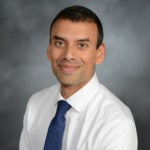
Abhishek Jaywant, PhD
Assistant Professor
Departments of Psychiatry & Rehabilitation Medicine
Weill Cornell Medicine
Email: abj2006@med.cornell.edu
Dr. Abhishek Jaywant is a clinical neuropsychologist, Assistant Professor at Weill Cornell Medicine, and Assistant Attending Psychologist at NewYork-Presbyterian Hospital/Weill Cornell Medical Center. Dr. Jaywant received his Bachelor of Science in Psychology from McGill University. He completed his Ph.D. in Clinical Psychology at Boston University, receiving clinical training at the VA Boston Healthcare System, Beth Israel Deaconess Medical Center/Harvard Medical School, and Boston University’s Center for Anxiety and Related Disorders. He was the recipient of a National Research Service Award from the National Institute of Neurological Disorders and Stroke, which funded his doctoral dissertation investigating visual-motor deficits and rehabilitation in Parkinson’s disease. He completed his clinical psychology internship at the Alpert Medical School of Brown University, and his postdoctoral fellowship in clinical neuropsychology in the Departments of Psychiatry and Rehabilitation Medicine at Weill Cornell Medicine.
As a postdoctoral fellow and now faculty member at Weill Cornell, Dr. Jaywant has published several scientific articles focused on validating and refining neuropsychological assessment instruments for individuals with stroke in the acute inpatient rehabilitation setting. This line of research sought to determine the relationship between neuropsychological assessment and short- and long-term functional improvement after stroke. Dr. Jaywant’s current area of research is in developing novel, neuroscience-inspired cognitive interventions to improve working memory after stroke. He is developing a novel working memory intervention that is targeted at the neural circuitry underlying post-stroke working memory dysfunction (assessed via resting state fMRI). The goal of this work is to improve the efficacy and real-world transfer of cognitive interventions, and to use neuroimaging to predict intervention response.
In addition to this work, Dr. Jaywant collaborates with neuroscientists at Weill Cornell on projects investigating the longitudinal course of structural and functional brain changes and associated cognitive difficulties following multiple sclerosis and traumatic brain injury. His recent work in the neuropsychological assessment and treatment of recovering COVID-19 survivors undergoing acute rehabilitation has engendered a secondary interest in applying similar techniques and methodologies to understanding longitudinal trajectories after COVID-19.
2019

Konstantinos Michmizos, PhD
Associate Professor
Department of Computer Science
Rutgers University
Email: michmizos@cs.rutgers.edu
Konstantinos Michmizos has been a tenure-track Associate Professor in Computer Science at Rutgers University since 2015, where he directs the Computational Brain (ComBra) Lab, with the goal to harness and nurture intelligence, by replicating it to serve people’s life or targeting it to assist people’s recovery. His Lab couples computational neuroscience, artificial intelligence and robotics, to develop AI methods that 1) identify new therapeutic connections between the micro (cellular) and the macro (behavioral) scales of brain function; and 2) integrate to rehabilitation robots as they interact with brain dysfunction to steer it towards normalcy.
Konstantinos has received graduate and post-graduate training in BME, ECE, MechE and a medical department, at MIT, Harvard Medical School, McGill University and the National Technical University of Athens. He has over 70 publications, establishing a translational research track on computationally capturing brain function and restoring its dysfunction.
At Rutgers, Konstantinos also serves at the Executive Council for the Center for Cognitive Science and he is a Faculty member of the Brain Health Institute and the Center for Computational Biomedicine Imaging and Modeling.
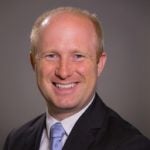
Matthew McLaughlin, MD, MS
Professor of Pediatrics
University of Missouri-Kansas City School of Medicine
Clinical Assistant Professor of Rehabilitation Medicine
University of Kansas-School of Medicine, Children’s Mercy Hospital
Email: mjmclaughlin@cmh.edu
Matt McLaughlin is a Pediatric Rehabilitation Medicine physician and Clinical Pharmacologist. His primary research centers on optimizing “the right medication for the right patient at the right time to improve outcomes.” He completed the MD/BA 6-year program at the University of Missouri-Kansas City prior to starting his fellowship at the University of Missouri-Columbia. After graduation from residency, he pursued a clinical Pediatric Rehabilitation Medicine fellowship at Children’s Mercy Hospital in Kansas City. During this time, he obtained his Masters in Medical Bioinformatics to help with clinical research design and database management. Upon graduation, he was named a Vice Chancellors Honors Recipient for obtaining a 4.0 GPA while also positively contributing to the Kansas City community. He received advance training in Clinical Pharmacology by participating in an NICHD T32 Fellowship in Pediatric Clinical and Developmental Pharmacology prior to starting his K12 funding.
Dr. McLaughlin’s primary research work has centered around precision medicine in pediatric patients with cerebral palsy (CP). Clinically, he remains passionate about how to employ the pharmacogenetics associated with alterations in medication absorption, distribution, elimination and metabolism with improving clinical outcomes. He employs aspects of pharmacokinetic modeling, pharmacogenomics and clinical trial design in his studies. His work earned him the Best Original Research Article by a Young Physician by the PM&R Journal in 2018. He is currently an Assistant Professor in the Department of Pediatrics at Children’s Mercy – Kansas City.
2018
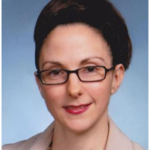
Robynne Braun, MD, PhD
Associate Professor of Neurology
University of Maryland School of Medicine
Co-Director, Stroke Rehabilitation Unit
University of Maryland Rehabilitation & Orthopaedic Institute
Email: robynne.braun@umm.edu
Robynne Braun is a physician/scientist with a research background in Kinesiology and clinical training in Rehabilitation Medicine. Since completing her Ph.D. in 2007, Dr. Braun has been building a career path that unites her research background in kinesiology with her clinical interests in neurological disorders. While in the M.D. with Honors in Research program at Loyola Stritch School of Medicine (2007 – 2011), she collaborated with the Kartje Lab at the Neuroscience Institute where she developed kinematic methods to evaluate motor recovery with stem cell therapy in a rodent model of stroke. She was awarded the 2010 Education Research Fund New Investigator Award, a seed grant from the Foundation for PM&R to support rehabilitation research.
During her subsequent residency training at the University of Washington, she collaborated with the Childers and Mack labs at the Institute for Stem Cell and Regenerative Medicine and initiated a new line of research examining the effects of exercise on gene therapy uptake for inherited myopathies. She has completed advanced training at the Johns Hopkins School of Public Health in the Science of Clinical Investigation Program, where she further refined her knowledge of clinical research design and implementation. Dr. Braun is an Assistant Professor in the Department of Neurology at the University of Maryland, where her work is focused upon clinical care and research in stroke rehabilitation. Her research focus is on rehabilitation of the upper extremity after stroke, and includes neurophysiologic (TMS, EMG), behavioral (kinematic) and neuroanatomic measures (MRI/tractography) of motor recovery. She also collaborates with researchers from the International Stroke Genetics Consortium to examine how genetic polymorphisms affect the propensity for motor recovery after stroke.
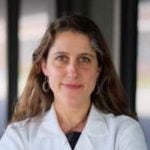
Ania Busza, MD, PhD
Associate Professor of Neurology
Stroke Division
University of Rochester Medical Center
Ania Busza received her undergraduate degrees in Biology and in Brain and Cognitive Sciences at Massachusetts Institute of Technology. She then completed her M.D. and Ph.D. training at the University of Massachusetts Medical School, where her doctorate work focused on how light and temperature cues help re-set the circadian clock. Her clinical training includes internship and residency in Neurology at Boston University Medical Center, followed by a Vascular Neurology (Stroke) Fellowship at the University of Rochester School of Medicine and Dentistry, where she is currently an Assistant Professor in Neurology as well as an Experimental Therapeutics fellow. Dr. Busza’s research centers on using a multi-disciplinary approach to develop new therapies for rehabilitation of patients with severe arm weakness due to stroke. Along with collaborators from the University of Rochester Computer Science department, she is developing a virtual arm model for early post-stroke motor rehabilitation. She is also developing a system using surface sensors to track rehabilitation exercise efforts in stroke patients. Ultimately, this work aims to take advantage of new technological advances in sensors and human-computer interfaces to improve our understanding and treatments for patients with weakness due to stroke.
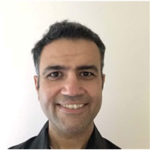
Vibhu Sahni, PhD
Assistant Professor of Neuroscience, Brain and Mind Research Institute
Weill Cornell Medicine
Director, Laboratory for Corticospinal Specification and Circuit Repair
Burke Neurological Institute
Email: vis2763@med.cornell.edu
Vibhu Sahni is a cellular and molecular neurobiologist with a strong interest in developmental and regenerative neuroscience. His proposed research investigates the molecular mechanisms underlying corticospinal tract (CST) and corticospinal neuron (CSN) plasticity and repair for neurorehabilitation. Paralysis is a leading cause of disability and CST damage results in paralysis in multiple chronic neurological disabilities such as spinal cord injury and motor neuron diseases such as amyotrophic lateral sclerosis (ALS). Dr. Sahni seeks to build on his background in molecular, developmental, and regenerative neuroscience to investigate whether developmental molecules that build distinct, anatomical and functional corticospinal circuits, can be recruited to enhance/direct neural plasticity for functional motor recovery following nervous system injury or disease.
During his PhD in neuroscience, under Prof. John Kessler at Northwestern University, Dr. Sahni studied axonal regeneration and recovery after SCI. He identified molecular mechanisms controlling stage- and cell-specific aspects of the injury response that could be manipulated to foster recovery.
He conducted his postdoctoral research in Prof. Jeffrey Macklis’s lab at Harvard University, investigating developmental mechanisms controlling CSN axonal segmental targeting. Here, he identified novel genes, which controlled bulbar-cervical- vs. thoraco-lumbar CST projections. This represents the core of a bi-directional molecular control system over CSN connectivity, the first for any spinal-projecting, motor pathway.
